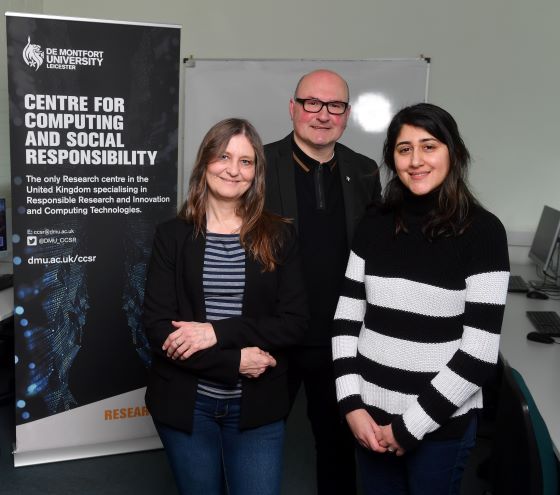Researchers from De Montfort University Leicester (DMU) are leading a new project to understand the key factors and characteristics that lead middle-aged people towards extremism and conspiracy theories on the internet.
Extreme political narratives have been rising across Europe and these narratives influence mainstream political discourses and policies. This is having a direct impact on perceptions of democratic institutions, trust in science, and leads to calls for direct action to overthrow or disrupt democratically elected governments.
The 2.7million Euro Horizon Europe project (the UK team is funded by UKRI), Social media narratives: addressing extremism in middle age (SMIDGE), was launched in response to increasing concern from governments across Europe at extreme political narratives found online, and how they may influence people aged 45 to 65.

Dr Sara Wilford, Prof Jason Lee and Dr Nitika Bhalla
“You often see research on younger users and how they are ‘easily influenced’ but relatively little has been done on how middle-aged people can be vulnerable to videos, posts and material that is online,” explained Dr Sara Wilford. “There is very little research examining this group, but the impact of them being drawn into extremist content may have significant consequences on political discourse, democratic processes and institutions.
“People in the age group 45-65 are actually very influential. They are more likely to vote, will tend to have more money and influence, and may also be decision-makers or policy-makers themselves. However, these people are more vulnerable than they think to misinformation posted online, with content targeted directly to them, feeding into their concerns and fears."
By analysing social media posts, content – video and text – posted by both mainstream and extremist groups and organisations affiliated with them, the research team aim to categorise the different types of narratives being shared, including identifying key characteristics which will also provide valuable data for future researchers.
Surveys, focus groups and interviews will help the researchers understand what makes people more vulnerable to extremism online, and factors which make them more likely to choose to view such content. The outputs from SMIDGE will provide evidence-based content, including counter-narratives, tools and resources that will directly help to counter extremist narratives from multiple perspectives, thereby providing greater understanding of the specificities and characteristics of those in middle-age and their vulnerability to extremism online.
The study involves eight teams from seven countries – Austria, Italy, Belgium, Kosovo, Cyprus, Denmark and the UK.
DMU’s research team –
Dr Sara Wilford Project Lead - Centre for Computing and Social Responsibility
Professor Jason Lee (Co-investigator) (Media Discourse Centre)
Professor Raouf Hamzaoui (Co-investigator) (Institute of Engineering Sciences)
Dr Nitika Bhalla (Project Manager) (Centre for Computing and Social Responsibility)
Posted on Thursday 16 March 2023